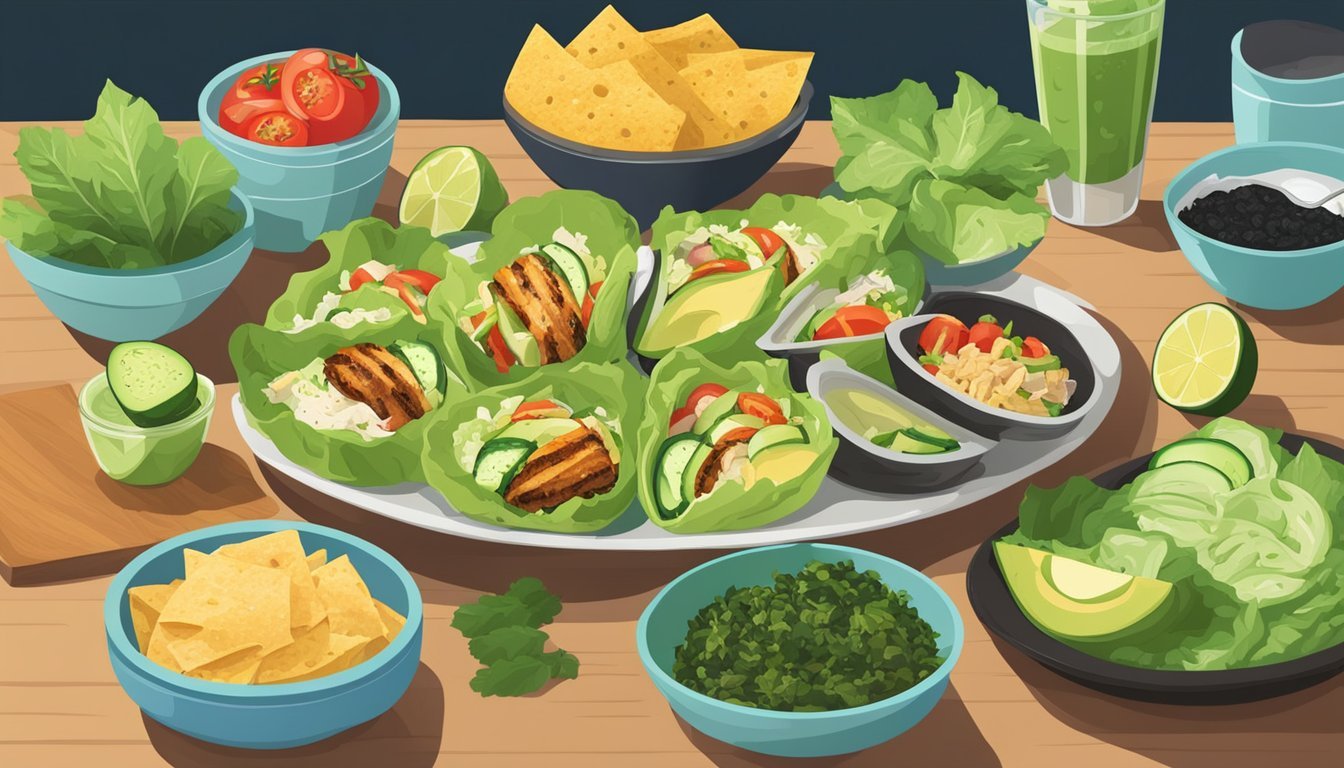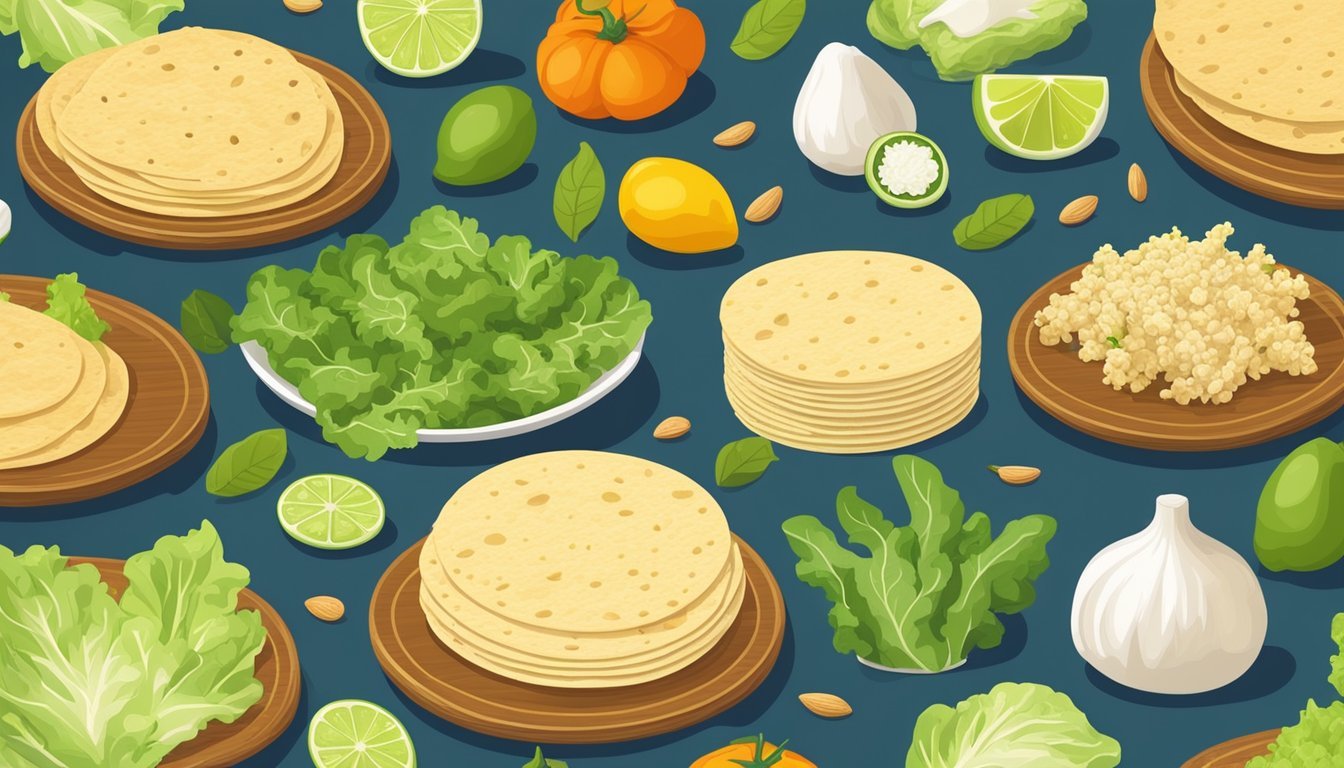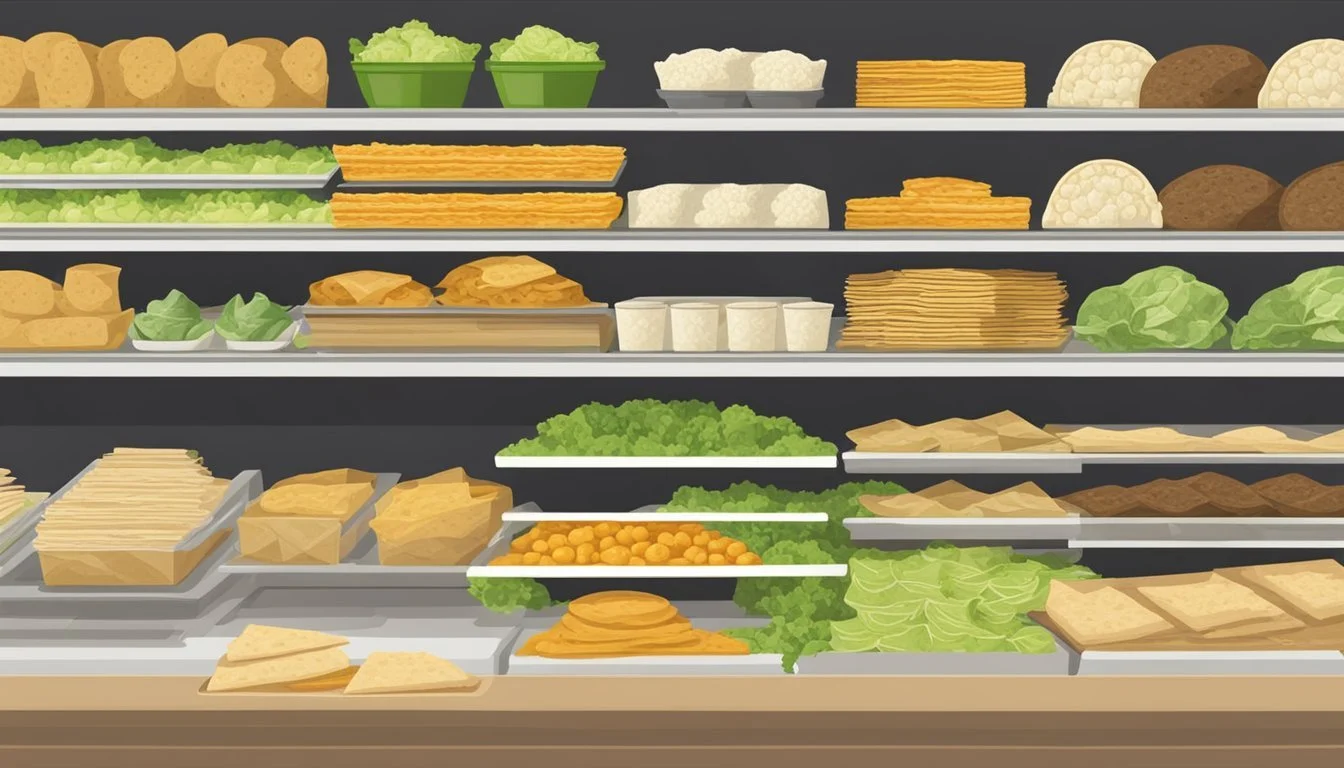Tortilla Substitutes
5 Healthy Alternatives for Wraps and Tacos
Opting for tortilla substitutes can be a smart choice for individuals seeking a healthier lifestyle or for those with specific dietary needs. Traditional tortillas are often made from wheat flour or corn and are a staple in various cuisines, particularly Mexican. However, they may not align with everyone's nutritional goals or dietary restrictions. Health-conscious consumers and those with gluten sensitivities, for example, are turning to alternative options that offer a balance of flavor and nutrients without compromising their dietary requirements.
Among the various alternatives available, nori sheets have gained popularity due to their gluten-free nature and rich nutritional profile. Made from roasted seaweed, nori sheets are not only a novel way to enjoy wraps but are also packed with vitamins and minerals. Another option that is gathering attention is grain-free tortillas, such as those made from almond flour. These tortillas cater to those following Paleo diets or having grain, soy, and dairy intolerances while providing a satisfying taste and texture. The trend of substituting traditional tortillas with nutrient-dense options demonstrates a shift towards innovative and healthful eating habits.
The Role of Tortillas in Diet and Health
Tortillas have been a staple food in various cultures and are known for their versatile use in many dishes. They are primarily composed of carbohydrates, which serve as the body's primary fuel source. The type of carbs found in tortillas can affect blood sugar levels differently. Traditional tortillas are made from either corn or wheat, providing a mix of simple and complex carbohydrates.
From a health perspective, high consumption of simple carbs found in some flour tortillas has been associated with blood sugar spikes, potentially leading to diabetes, obesity, and heart disease. Monitoring portion sizes and selecting tortillas with lower carbs can help reduce the risk of these conditions.
Nutrient Profile:
Fiber: Some tortillas contain fiber, which can promote satiety, reduce overeating, and help maintain stable blood glucose levels.
Protein: Varies depending on the ingredients used, with some offering a decent amount of this macronutrient.
Nutrients: Corn tortillas can provide nutrients such as magnesium and phosphorus.
For those managing health conditions:
Low-Carb Options: Options like lettuce wraps can offer a minimal amount of carbohydrates.
Gluten-Free Alternates: For individuals with celiac disease or gluten sensitivity, alternatives like nori sheets can be beneficial.
Impact on Blood Sugar: Substitutes such as coconut wraps may have a less dramatic effect on blood sugar, especially important for those with diabetes.
Understanding the nutritional content and impact on health is crucial when incorporating tortillas into a diet. Selecting whole grain or other healthier alternatives can contribute to better nutrition and health management.
Healthful Alternatives to Standard Wheat or Corn Tortillas
Choosing healthful alternatives to standard tortillas can enrich your diet with a variety of nutrients while catering to dietary restrictions and preferences. These substitutes range from whole-grain options to vegetable-based wraps, offering a spectrum of flavors and health benefits.
Whole Grain and Whole Wheat Options
Whole grain and whole wheat tortillas are a good source of fiber and nutrients compared to their refined counterparts. They contain the entire grain kernel, including the bran, germ, and endosperm, ensuring a higher content of fiber and essential minerals.
Low-Carb and Grain-Free Alternatives
For those adhering to a low-carb diet, grain-free alternatives such as almond flour and coconut wraps provide a satisfying substitution. These wraps are typically lower in carbohydrates and can be made from nuts or other low-carb ingredients, aligning with ketogenic and other carb-conscious eating plans.
Gluten-Free Substitutes
Gluten-free substitutes include tortillas made from rice flour, cassava flour, and other gluten-free grains. These alternatives are suitable for individuals with gluten sensitivities or celiac disease, offering a similar texture and taste to traditional tortillas without the gluten.
Vegetable-Based Substitutes
Vegetable-based substitutes like lettuce wraps, cabbage leaves, and zucchini slices not only slash carbohydrates but also boost intake of vitamins and minerals. Leafy greens such as kale and collard greens are particularly rich in vitamin C and iron.
Homemade Tortilla Options
Making tortillas at home allows for complete control over ingredients, ensuring healthier tortilla alternatives. Using whole, nutrient-dense ingredients maximizes the nutritional value of these homemade creations.
Legume and Seed Wraps
Wraps made from beans and seeds such as flax provide a combination of protein and fiber. These options often exhibit a unique, nutty flavor and contribute additional nutritional benefits like omega-3 fatty acids found in flax seeds.
Innovative Wrap Alternatives
Other innovative wrap alternatives include nori sheets and Swiss chard, which can be used in place of traditional tortillas. These alternatives not only offer a different set of nutrients but also introduce new textures and flavors to meals.
Considering Allergens and Dietary Restrictions
When exploring tortilla substitutes, it's vital to consider options that accommodate various allergens and dietary restrictions. This contributes to inclusive eating experiences while maintaining nutritional value and taste.
Vegan-Friendly Choices
For those adhering to a vegan diet, ingredients such as wheat or corn are typical bases for tortillas. However, for a gluten-free and vegan option, chickpea flour or almond flour can be used. These alternatives provide a rich source of protein and eliminate common allergens such as dairy and eggs. Additionally, whole foods like leafy greens can be used as a wrap in place of traditional tortillas.
Paleo-Conscious Alternatives
Paleo diet followers seek out grain-free options that are also free from refined carbs and preservatives. Tortillas made from cassava flour or tapioca flour are excellent choices that mimic the texture of traditional tortillas. Coconut wraps, made with coconut meat, coconut water, and unrefined virgin coconut oil, also align with the paleo philosophy of whole, unprocessed foods.
Keto Diet Compatible Options
Those on a keto diet require low-carb diet solutions. Tortillas that use almond flour, flaxseeds, or egg whites provide the necessary fat and protein while reducing carbohydrates. Homemade tortilla substitutes using these ingredients offer a healthy, keto-friendly option without the high-carb count.
Free from Refined Carbs and Preservatives
Health-conscious individuals often seek tortilla alternatives without refined carbs and preservatives. Substitutes using ingredients like cauliflower, spinach, or zucchini can offer nutrient-dense options. These whole-food ingredients create healthy tortillas that are not only grain-free and gluten-free but also add a serving of vegetables to one's diet.
The Impact of Tortilla Substitutes on Weight Management
When examining the role of tortilla substitutes in weight management, it's crucial to consider their nutritional composition. Low-carb tortilla alternatives can help individuals reduce their calorie intake, which is beneficial for those aiming to lose weight. For instance, coconut and almond flour tortillas provide a lower carbohydrate content compared to traditional wheat or corn tortillas, potentially reducing the likelihood of insulin spikes and aiding in the management of blood sugar levels.
Tortillas made from nutrient-dense ingredients also contribute to a feeling of satiety, which can help prevent overeating. Fiber plays a significant role here as high-fiber options contribute to fullness, thereby supporting weight control. Nori sheets, as a gluten-free substitute rich in vitamins and minerals, are an example with low caloric content and substantial nutritional benefits.
Individuals often consider nutrient density when choosing substitutes to ensure they're receiving ample vitamins and minerals without consuming excessive calories. Substitutes made with whole-food ingredients, such as those containing almond flour, often provide healthy fats and a moderate amount of protein, which are essential for a balanced diet.
However, it's important to balance these benefits with portion control as some alternatives can be higher in calories. Evaluating the total fats and the presence of any added starches that might increase the carbohydrate content is crucial for those strictly managing their diet for health or weight loss objectives.
Tortilla Type Carbohydrate Content Fiber Content Notable Nutrients Coconut Wraps Varied Low - Nori Sheets Very Low Varied Vitamins, Minerals Almond Flour Moderate High Healthy Fats, Protein
It's apparent that tortilla substitutes offer diverse options to support weight management goals, but consumers must be mindful of their overall nutrition and personal dietary needs when incorporating these alternatives.
Leveraging Tortilla Substitutes in Popular Dishes
Embracing alternative options can reinvent traditional taco, sandwich, and Mexican cuisine recipes, often adding nutritional benefits and variety to the dining experience.
Transforming Taco Tuesday
Taco Tuesday can experience a healthy twist by substituting lettuce wraps for traditional taco shells. This change adds a crisp texture and cuts down on carbohydrates. Lettuce wraps are not only calorie-friendly but also provide a fresh complement to the robust flavors of taco fillings, such as seasoned meat or grilled vegetables. For those avoiding gluten, the use of nori sheets—roasted seaweed—offers a unique, nutrient-rich shell option, enhancing tacos with a subtle, oceanic flavor.
Innovative Sandwich Creations
Sandwiches are an everyday staple, and replacing typical tortillas with alternatives like pita bread or cloud bread can transform the usual wrap. Pita bread, with its soft texture and convenient pocket, is ideal for housing a variety of fillings, from traditional Greek ingredients to Mexican-inspired guacamole and beans. For a lighter touch, cloud bread provides a low-carb option that's keto-friendly without sacrificing the airy satisfaction that bread brings to sandwiches.
Creative Mexican Cuisine Adaptations
Mexican cuisine thrives on the art of the wrap, and exploring substitutes for corn tortillas can lead to delightful variations. Dosa, a type of Indian flatbread, can serve as an inspired replacement, introducing a sourdough tang to complement Mexican spicing. Coconut wraps, made from coconut meat and water, offer a sweet, grain-free alternative suitable for gluten-sensitive individuals; they pair exceptionally well with sweeter fillings or tropical salsas, broadening the flavor profile of traditional Mexican dishes.
Nutritional Insights and Health Advantages
When individuals seek healthier options for their diets, tortilla substitutes offer a wealth of nutritional benefits. These alternatives often contain an array of essential nutrients that contribute to a balanced diet.
Nori Sheets: These are notable for being rich in vitamins and minerals, including vitamin C and iron. By opting for nori sheets, one obtains a gluten-free choice that supports overall health with minimal calories and a robust nutrient profile.
Coconut Wraps: Coconut wraps are low-carb and favorable for maintaining steady blood sugar levels. They are important for energy regulation. However, it's vital to monitor the saturated fat content and check for added starches which could increase the carbohydrate content.
Lettuce Wraps: A vivid example of a low-calorie substitute, lettuce is rich in fiber and water content, promoting digestive health without unnecessary carbs.
Almond Flour Tortillas: These are typically grain-free, a boon for those with specific food intolerances, and often preferred by individuals following a paleo diet. They offer a good balance of flavor and are moderate in protein and fiber, supporting muscle health and satiety.
Healthy tortilla alternatives like these can contribute positively to one's diet by providing essential nutrients without the higher carbohydrate and fat content that traditional wheat or corn tortillas can carry. They can serve as vehicles for a variety of nutrient-dense fillings, making them versatile components of a health-conscious lifestyle.
Selection and Storage of Tortilla Substitutes
When selecting tortilla substitutes, one should consider their dietary preferences and the purpose for which they are being used. Store-bought options like pita bread and nori sheets are readily available and cater to different dietary needs such as gluten-free or whole grain options.
For store-bought substitutes:
Check the expiration date to ensure freshness.
Look for signs of mold or unusual odors which indicate spoilage.
Choose brands that offer whole grain options for additional nutritional benefits.
Homemade alternatives, such as flaxseed tortillas or lettuce wraps, can be tailored to individual taste and health requirements. Store them appropriately to maintain freshness.
Storage tips for homemade substitutes:
Lettuce Wraps:
Refrigerate in airtight containers or wrapped in paper towels.
Consume within a few days as they lose crispness quickly.
Flaxseed Tortillas:
Keep in a cool, dry place if consumed within a day.
For long-term storage, refrigerate or freeze with parchment paper between each tortilla.
Nori Sheets:
Store in a cool, dark place to prevent them from becoming soggy.
Pita Bread:
Store in a bread box at room temperature for short-term use.
For longevity, freeze with separation to prevent sticking.
It's essential to control moisture to prevent mold and spoilage, especially for substitutes like pita bread or homemade options. Paying attention to these details helps ensure the substitutes are enjoyable and safe to consume.
Ideas for Incorporating Tortilla Alternatives into Meal Planning
In meal planning, incorporating tortilla alternatives can offer nutritious variety and support a low-carb diet. These substitutes often integrate more vegetables and whole grains, serving as a fresh take on traditional wraps and fillings.
Breakfast Variations
For a homemade breakfast twist, one can use nori sheets or lettuce leaves to create veggie wraps filled with scrambled eggs and sliced avocados. These alternatives provide a low-carb option that is high in vitamins and minerals. Try using:
Nori sheets: With a side of fruit for a balanced breakfast.
Lettuce wraps: Stuffed with a tofu scramble for those who prefer a plant-based start to the day.
Healthy Lunch Solutions
Lunchtime benefits from leafy greens like romaine or iceberg lettuce used as wraps. They are crisp, refreshing, and serve as a practical tortilla alternative for a variety of fillings. It's recommended to explore:
Cabbage cups: Perfect for holding a mixture of grilled chicken, bell peppers, and a sprinkle of cheese.
Homemade coconut wraps: Ideal for a midday meal, just fill with mixed veggies, sprouts, and a lean protein.
Dinner Delights with Low-Carb Alternatives
Dinner can be elevated with substitutes such as flaxseed wraps, offering a nutritious end to the day. A flaxseed wrap can encase savory fillings like grilled fish or sautéed vegetables, aligning with a low-carb diet. Consider incorporating:
Ground flaxseed wraps: Use in place of traditional tortillas for fajitas topped with sautéed onions and bell peppers.
Cloud bread: A light option that pairs well with a variety of dinner proteins and roasted veggies.
Additional Considerations
This section explores critical aspects such as the role of tortillas in an exercise regimen, the medicinal and nutritional implications of their substitutes, and the kitchen tools necessary for crafting homemade alternatives.
Understanding the Relationship Between Tortillas and Exercise
Tortillas, a staple in various cuisines, are often part of meals that fuel one's body before or after exercise. When opting for substitutes, individuals should consider the energy and nutrient content in relation to their workout intensity and goals. Whole grain alternatives may provide sustained energy, ideal for long-distance runners, while low-carbohydrate options like lettuce wraps might be preferred by those focusing on weight loss or muscle definition.
Medicinal and Nutritional Advice
Substitutes for tortillas must be chosen with health considerations in mind. For individuals with gluten intolerance, nori sheets or coconut wraps serve as nutritious, gluten-free alternatives rich in vitamins and minerals. It is essential for individuals with specific medical conditions to consult their physician to ensure that the substitute aligns with their dietary needs. One should not substitute professional medical advice with general nutritional information.
Kitchen Tools for Homemade Tortilla Alternatives
Crafting homemade tortilla alternatives requires specific kitchen tools to ensure efficiency and quality. A rolling pin or tortilla press can aid in creating uniform thickness for grain-free tortillas, such as those made with almond flour. A non-stick skillet is crucial for cooking options like cloud bread or dosa, while a food processor may be necessary for blending ingredients. Additionally, for those concerned about hydration and health, incorporating a water filtration system ensures that the water used in homemade meals is clean and pure.
Resources and Further Reading
When exploring tortilla substitutes for health, nutrition, or dietary reasons, it's essential to consult a variety of sources. These can range from online communities that focus on wellness and culinary advice, to in-depth cookbooks, and scientific health publications. These resources offer insights into nutritional value, potential benefits for medical conditions, and even recipes for those pursuing weight loss.
Online Wellness and Culinary Communities
Online platforms provide a wealth of information for those interested in wellness, beauty, and nutrition. Websites such as Blissmark offer diverse content focused on healthy living, including smart food substitutions like low-carb tortilla alternatives. For real-time discussions and advice, one might venture into culinary forums or social media groups that share the latest food trends catering to specific dietary needs.
Cookbooks and Nutritional Guides
Cookbooks and nutritional guides are invaluable for anyone looking to cook healthily. They often contain detailed information on ingredients, including their caloric content and nutritional value. Readers can explore titles that emphasize low-carb or gluten-free recipes, often recommending tortilla substitutes that align with weight loss or health goals. These guides help individuals understand food's impact on wellness and provide practical, delicious alternatives to traditional staples.
Scientific Studies and Health Publications
For those seeking a more scientific approach to their diet, numerous health publications offer studies on how different foods affect the body. Medical journals provide research-backed insights into how non-traditional tortilla substitutes can benefit or detract from one's health, taking into account medical conditions such as diabetes or gluten intolerance. Reading these studies can empower individuals with the knowledge to make informed dietary choices, ensuring their tweaks to tradition enrich their health.








